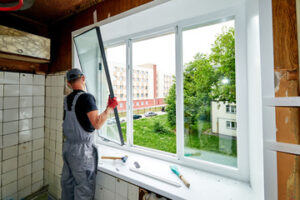Roofing isn’t an easy project, and it requires specific skills and equipment. For this reason, it is a task best left to professionals.

Start by inspecting the existing roof for damage and making repairs. Then, the underlayment can be laid — this could be a membrane or tar paper for extra moisture protection. Visit https://www.fivestarroofingandcontracting.com to learn more.
The roofing contractor will begin by clearing out the workspace and removing any loose debris. Next, they will install ice barrier underlayment (in cold climates), drip edge flashing, and sheathing to protect the decking from moisture and sun damage. They will also lay metal flashing in roof valleys, along chimneys and wood stove pipes, and around vents to prevent leaks. They will then apply a layer of synthetic underlayment to prevent future leaks, followed by the first row of shingles. They will overlap each shingle by at least 6 inches and secure them with cap nails.
The home or business owner should be present during this process to ensure that the installation is done correctly and as per the plan, especially if any decisions need to be made on the spot. A good contracting company will be transparent with their processes and provide clear communication to the property owner so that they have a better understanding of what is being done and why.
If the property owner can not be present during the installation, they should make arrangements to move their vehicles away from the work area. This is not just to protect their vehicle from scratches and dents, but it will allow them to get in and out of the driveway without having to drive over strewn construction debris and other waste materials. The same goes for securing children and pets from the commotion and falling debris during the tear off and roof restoration process.
Depending on the size of the structure to be roofed, the roofing process can take anywhere from one day to three days. During this time, it is common for the daily routine to be disrupted by noise and limited access to the house or building. It is also important to understand that there may be delays due to weather and material delivery. Having this knowledge ahead of time will help to reduce stress and frustration during the project and keep everyone safe and happy in the end.
Materials
Roofing materials protect building occupants and interiors from outside weather conditions, primarily moisture. The roof, insulation and ventilation work together to prevent moisture buildup that could lead to rot and mold growth. The roof, insulation and ventilation also protect the structure from solar energy penetration. When choosing a roofing contractor, be sure to research their reputation and social media channels to see what other clients are saying about them. Ask for references and verify that the company has a registered business name, permanent address and a valid license to operate in your state.
Depending on the type of roof, there are many different roofing materials to choose from. Asphalt shingles are the most common roofing material in America, and come in a variety of colors and shapes. The shingle style can vary as well, from basic 3-tab to architectural shingles. Other options include clay or concrete tiles, which are more durable and offer a natural aesthetic. Synthetic roofing is a more affordable option that can mimic the appearance of other types of roofing materials.
Roof sheathing, also known as roof decking, is the base layer that supports shingles and other roofing materials. Its primary function is to fortify the roof, evenly distribute weight and avert problems like sagging or bowing. It can be made of wood, including plywood and OSB, or alternative materials like exterior gypsum board.
Other roofing materials are metal panels, which provide great protection against water, sun and wind. They can be installed quickly, and are available in a wide range of styles. They are a good choice for flat or low-pitched roofs, and can be installed on most structures. They can be more expensive than shingles, however.
For commercial and industrial buildings, a membrane roofing system is a great choice. It provides excellent protection against water, UV rays and wind, is durable and requires minimal maintenance. However, this type of roofing is best for new construction and not appropriate for existing roofs.
To ensure a successful roofing installation, it is important to have the right tools and materials on hand. For instance, you will need a wide selection of fasteners to secure the various materials. Likewise, you will need an underlayment to protect the roof deck from moisture damage. The most popular choice is felt underlayment, but there are also synthetic alternatives that offer greater longevity and resistance to weather conditions.
Installation
Roofing installation involves building or replacing a roof to protect a home from weather damage. Professional roofers use a variety of materials and techniques to ensure durability, including underlayment, ventilation, flashing, and sealing. They also inspect and repair the roof deck before applying the final roofing material. A well-designed installation plan helps to minimize disruptions and cost overruns. Reputable contractors can develop a detailed timeline and contingency plans to address unexpected issues. They also understand local building regulations and permit requirements and help homeowners navigate the process.
The roofing contractor will start by removing any existing roofing materials and then inspecting the roof deck. If necessary, they will install underlayment to prevent water leaks and protect the roof from wind and hail damage. Next, they will apply the final roofing material – whether asphalt shingles, metal panels, or another material – using a wide range of tools and equipment, including ladders, shingle cutters, and nail guns. Roofers will also install drip edge to protect the eaves and vents to enhance attic ventilation. Additional features like skylights, chimneys, and vent pipes are installed as needed.
A final inspection is conducted to verify that the roofing installation meets industry standards and manufacturer specifications. The roofing contractor will also check that the ridge cap is securely fastened and creates a watertight seal at the peak of the roof. They will also inspect the installation of flashing and sealing around the eaves, roof valleys, and any areas where roofing meets a vertical surface like a wall or dormer. They will also check that the gutters are properly fastened to the fascia board and pitched down to extend far enough away from the house to prevent water pooling near the foundation.
Final Inspection
As part of the construction process, every building must undergo a final inspection. This is the last chance to catch any small issues that might turn into large problems later. It is also a great opportunity to validate that the work completed matches the approved plans.
A building inspector will examine all aspects of the structure, including the foundation, walls, and roof to ensure that it complies with regulations. The inspector will also check that electrical, plumbing, and HVAC work meets code requirements and is free of leaks and other defects. Lastly, the inspector will look at the finished exterior to make sure that it is watertight and that any grade slopes away from the structure.
It is vital to make sure that the final inspection is completed before making any payments for construction services. Failure to do so could result in legal troubles down the line. In addition, a successful final inspection will elevate the resale value of your property.
In the case of a new home, your real estate agent should have provided you with a list of required inspections before you signed the contract to buy. Using this checklist, you can ensure that you are calling in the correct inspections at the right times.
Some inspections are mandatory, while others can be called in at the discretion of the building inspector. For example, a Pre-Roofing or Tear-Off Inspection is necessary before any sheathing is covered. A Sheathing and Dry-Inspection is a group inspection that can be done together, or you can call in an In-Progress inspection to cover the sheathing, framing, and roofing phases.
The Applicant of Record must make any requested revisions to the approved plans prior to scheduling a Final inspection. This includes changing any dimensions or items that do not meet code requirements. Additionally, you must make sure that all required department inspections have been performed and self-certified by the SIA, any outstanding fees are paid, and that you have final clearance from the building & safety, planning, public works roads, and fire departments. These steps must be taken before utilities can be released and a Certificate of Occupancy can be issued.


